The Ultimate Guide to the American Pit Bull Terrier Dog
Introduction
 Welcome to the world of the American Pit Bull Terrier! This comprehensive guide delves into every facet of this remarkable breed, from its history to its care requirements. Whether you're a seasoned Pit Bull enthusiast or a newcomer intrigued by their charm, this guide is your passport to understanding one of the most misunderstood and beloved breeds.
Welcome to the world of the American Pit Bull Terrier! This comprehensive guide delves into every facet of this remarkable breed, from its history to its care requirements. Whether you're a seasoned Pit Bull enthusiast or a newcomer intrigued by their charm, this guide is your passport to understanding one of the most misunderstood and beloved breeds.
Brief Summary Description
The American Pit Bull Terrier, often referred to simply as the Pit Bull, is a breed that evokes strong emotions and opinions. Known for their loyalty, intelligence, and muscular build, Pit Bulls are often misunderstood due to misconceptions perpetuated by media sensationalism. In reality, these dogs are affectionate, energetic, and highly trainable companions.
Considerations
Before bringing a Pit Bull into your home, there are crucial considerations to keep in mind. Their exercise needs, training requirements, and potential breed-specific legislation in your area should all be researched thoroughly. Commitment to their well-being and providing a loving environment is paramount.
Interesting Facts and Fun Facts
Did you know that the American Pit Bull Terrier was once regarded as a symbol of American pride and loyalty? These dogs were celebrated as war heroes and household pets alike. Today, they continue to showcase their versatility in various roles, from therapy dogs to search and rescue partners. Despite their tough exterior, Pit Bulls are renowned for their love of children and their eagerness to please their human companions.
Breed Background and History
Origin and Development of the American Pit Bull Terrier
The roots of the American Pit Bull Terrier trace back to 19th-century England, where they were bred from Bulldogs and Terriers. These dogs were initially used in bloodsports, but their tenacity, strength, and loyalty led to a transformation into farm dogs and working companions.
Historical Significance or Cultural Relevance
In the early 20th century, Pit Bulls became popular family pets and were admired for their loyalty and bravery. They were cherished members of American households and were even featured in advertisements, symbolizing strength and resilience.
Purpose or Original Use of the American Pit Bull Terrier
Originally bred for bull-baiting and later for ratting, the Pit Bull's agility and strength made them adept at various tasks. Their transition from working roles to family companions reflects their adaptability and loyalty to their human families.
Kennel Clubs
While the American Pit Bull Terrier is not recognized by major kennel clubs like the American Kennel Club (AKC), there are breed-specific registries dedicated to preserving the breed's heritage. Organizations like the United Kennel Club (UKC) and the American Dog Breeders Association (ADBA) provide platforms for Pit Bull enthusiasts to showcase their dogs in various activities.
Appearance
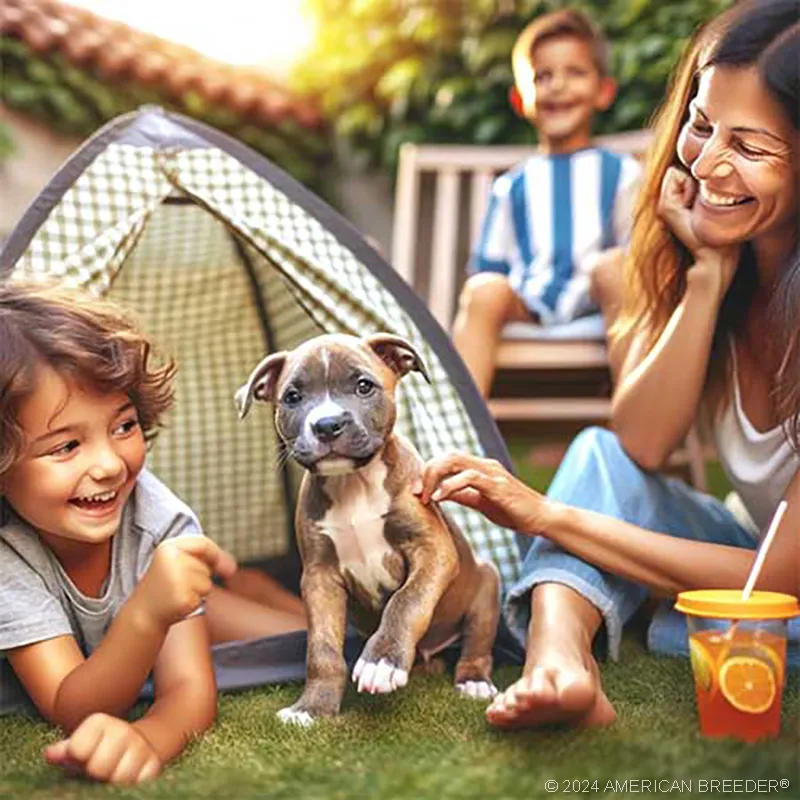 Size, Weight, Activity Level, and Physical Appearance
Size, Weight, Activity Level, and Physical Appearance
American Pit Bull Terriers typically weigh between 30 to 60 pounds, with males being larger than females. Their muscular build and agile frame contribute to their athleticism and energy levels. Regular exercise is essential to keep them mentally stimulated and physically fit.
Coat Type, Color Variations, and Patterns
Pit Bulls boast a short, glossy coat that comes in a range of colors, including blue, red, brindle, and fawn. Some may exhibit distinctive markings or patterns, adding to their individuality.
Distinctive Features or Markings
A Pit Bull's most distinctive feature is its strong jaw and powerful bite. Their expressive eyes and alert ears give them an intelligent and attentive appearance.
Average Litter Size for the American Pit Bull Terrier
Pit Bulls typically have litters of around 5 to 10 puppies. Proper breeding practices and attentive care during the whelping process contribute to the health and vitality of the puppies.
Temperament and Personality
Typical Temperament Traits and Behavior Tendencies
The American Pit Bull Terrier's temperament is a harmonious blend of affection, loyalty, and intelligence. They form strong bonds with their families and are renowned for their love of children. Pit Bulls are eager to please, making them excellent candidates for training and various roles, including therapy and service work.
Energy Levels and Activity Requirements
Pit Bulls are energetic dogs that thrive on physical activity and mental stimulation. Regular exercise, interactive play, and engaging training sessions are crucial to prevent boredom and channel their energy positively.
Compatibility with Different Lifestyles and Family Dynamics
Their versatility allows Pit Bulls to adapt to various living situations, from families with children to singles or seniors. They excel in active households that can provide the exercise and attention they crave.
List of Typical Behavior Issues
Understanding potential behavior issues is key to proactive management.
 Like any breed, Pit Bulls may exhibit behaviors such as aggression, barking, or separation anxiety. However, with consistent training and early socialization, many of these challenges can be mitigated.
Like any breed, Pit Bulls may exhibit behaviors such as aggression, barking, or separation anxiety. However, with consistent training and early socialization, many of these challenges can be mitigated.
Aggression and Biting: Pit Bulls are not inherently aggressive, but improper training and socialization can contribute to aggressive behaviors. Responsible ownership and early socialization play a crucial role in preventing aggression.
Excessive Barking: Barking is a form of communication for dogs, but excessive barking can be a sign of boredom or anxiety. Addressing the root cause and providing mental stimulation can help curb this behavior.
Digging Behavior: Digging is a natural instinct for many dogs, including Pit Bulls. Providing designated digging areas and engaging activities can redirect this behavior.
Separation Anxiety: Pit Bulls are known for their loyalty, which can sometimes lead to separation anxiety when left alone. Gradual desensitization, crate training, and engaging toys can help alleviate this issue.
Resource Guarding: Like any dog, Pit Bulls may exhibit resource guarding behavior. Early training and positive reinforcement can help them learn to share and avoid possessive behaviors.
Fear and Phobias: Proper socialization during puppyhood is vital to prevent fear-based behaviors. If your Pit Bull shows signs of fear or phobias, seeking professional training and guidance is recommended.
Trainability Level and Ease of Learning
The American Pit Bull Terrier's intelligence and eagerness to please make them highly trainable. They excel in obedience training, agility, and various dog sports. Consistent, positive reinforcement methods are essential for successful training sessions.
Willingness to Please Their Owner
Pit Bulls have an innate desire to please their owners, which contributes to their trainability. They thrive on praise, treats, and affection as rewards for following commands and exhibiting desired behaviors.
Intelligence and Problem-Solving Abilities
Pit Bulls possess a keen intellect and problem-solving abilities. This intelligence can sometimes manifest as stubbornness, but with patient training, their problem-solving skills can be directed toward positive behaviors.
Recommended Training Approaches and Techniques
Positive reinforcement training methods are most effective with Pit Bulls. This involves rewarding desired behaviors with treats, praise, or toys. Harsh training methods can lead to fear and distrust, so a gentle and patient approach is crucial.
Training or Skills Best Suited for the American Pit Bull Terrier
Pit Bulls shine in various training activities and roles due to their intelligence and athleticism. They excel in agility, obedience, rally, and even scent work. Their versatility allows them to become well-rounded companions who thrive on mental challenges.
Practical Considerations
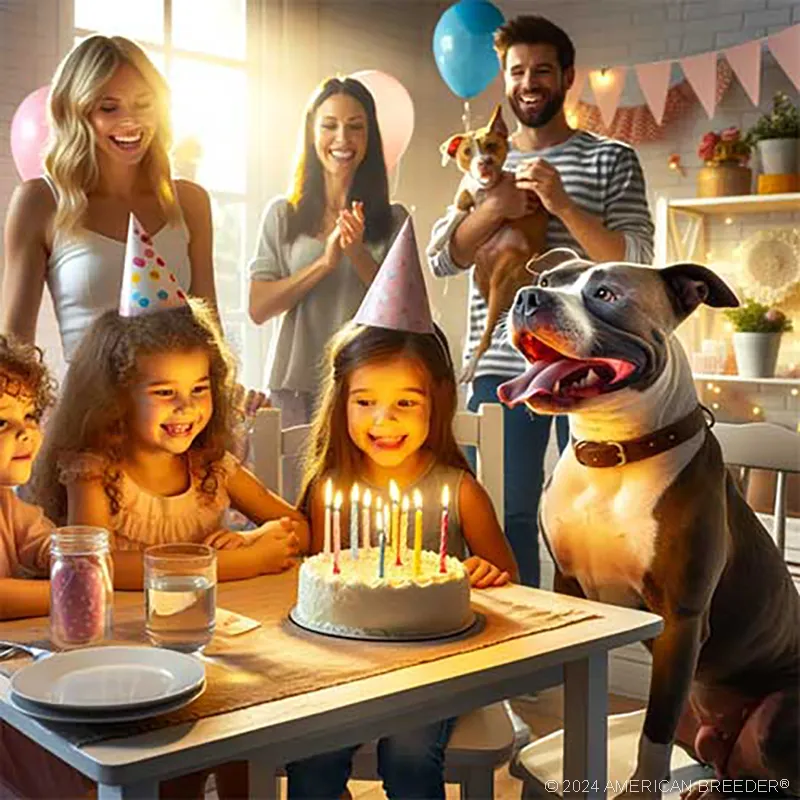 Size of Sleeping Quarters Depending on Size
Size of Sleeping Quarters Depending on Size
When considering where your Pit Bull will sleep, it's important to accommodate their size. Provide a comfortable and safe sleeping area, such as a dog bed or crate, where they can rest undisturbed.
Typical Annual Veterinary Cost
Regular veterinary care is essential to your Pit Bull's health. The annual cost can vary depending on factors such as vaccinations, preventive medications, and potential health issues. Budgeting for routine check-ups and unforeseen medical expenses is recommended.
Type of Grooming and Annual Cost
Pit Bulls have a short coat that requires minimal grooming. Regular brushing helps maintain their coat's shine and removes loose hair. This breed's grooming needs are relatively low, reducing the overall grooming costs.
Daily Exercise Needs and Requirements
Pit Bulls are energetic dogs that require daily exercise to remain mentally and physically healthy. Engaging in activities like walks, playtime, and mental stimulation games helps meet their exercise needs and prevents behavioral issues.
Health and Care
Common Health Issues or Predispositions
While the American Pit Bull Terrier is generally a healthy breed, there are certain health issues to be aware of. These may include hip dysplasia, allergies, skin conditions, and breed-specific concerns like heart disease. Regular veterinary check-ups and preventive care are crucial to catch any potential health issues early.
Allergies and Specific Dietary Considerations
Pit Bulls can be prone to allergies, including food allergies. Choosing a high-quality dog food that is free from common allergens can help prevent allergic reactions. Consult your veterinarian if you suspect your Pit Bull has allergies.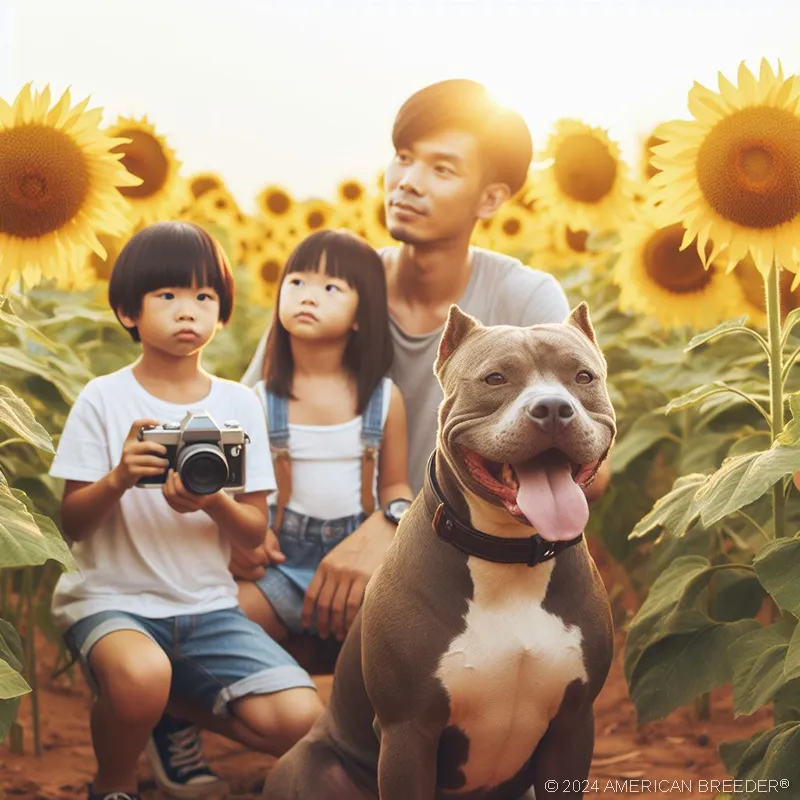 Lifespan and Longevity Expectations
Lifespan and Longevity Expectations
With proper care, Pit Bulls can live an average of 12 to 14 years. A balanced diet, regular exercise, routine veterinary visits, and preventive care contribute to their longevity.
Grooming Requirements Based on Coat Type and Size
The Pit Bull's short coat requires minimal grooming. Regular brushing helps remove loose hair and keeps their coat looking its best. Additionally, routine nail trimming, ear cleaning, and dental care are important aspects of their grooming routine.
Exercise Needs and Recommendations for Physical and Mental Stimulation
Pit Bulls are active dogs that thrive on exercise and mental stimulation. Engaging in regular activities like walks, runs, and interactive play not only keeps them physically healthy but also prevents boredom and behavioral issues.
Nutrition and Feeding Guidelines
A balanced and nutritious diet is essential for your Pit Bull's overall well-being. Consult your veterinarian to determine the appropriate portion sizes and feeding schedule based on your dog's age, weight, and activity level. High-quality dog food that meets their dietary needs is essential for their health.
Vaccination Schedule and Preventive Care
Maintaining a regular vaccination schedule is vital to protect your Pit Bull from preventable diseases. Core vaccines such as rabies and distemper are crucial, along with non-core vaccines based on your dog's lifestyle and risk factors.
Socialization and Compatibility
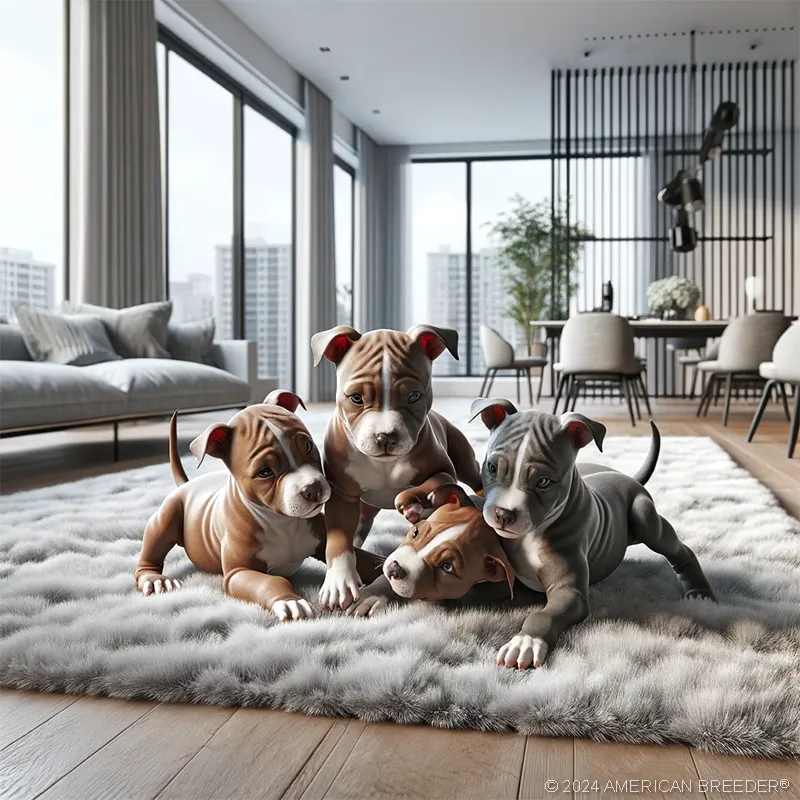 Interaction with Children, Other Pets, and Strangers
Interaction with Children, Other Pets, and Strangers
The American Pit Bull Terrier's friendly nature makes them generally good companions for children when properly socialized. Early exposure to children, other pets, and strangers helps develop positive behaviors and prevents potential issues.
Socialization Needs and Tips for Proper Socialization
Proper socialization during puppyhood is crucial for Pit Bulls. Exposing them to various environments, people, and animals helps them develop into well-adjusted adults. Controlled and positive experiences build their confidence and reduce fear or aggression.
Precautions or Considerations for Multi-Dog Households
Pit Bulls can thrive in multi-dog households if introduced properly. Supervised introductions, gradual acclimation, and positive reinforcement are essential for a harmonious pack dynamic.
Level of Ease When It Comes to Training
Pit Bulls are intelligent and eager to please, which aids in training. They respond well to positive reinforcement methods, and early training can help prevent potential behavior challenges.
Playtime and Exercise with Other Dogs or Pets
Engaging in playtime and exercise with other dogs and pets can be beneficial for Pit Bulls. Interactive play fosters social bonds and burns off excess energy, promoting a well-rounded and contented dog.
Dog-Friendly Activities and Outings
Pit Bulls enjoy outdoor activities such as hiking, swimming, and participating in dog sports like agility. These experiences not only provide physical exercise but also strengthen the bond between you and your loyal companion.
Living Arrangements and Environment
Suitability for Different Living Arrangements
Pit Bulls can adapt to various living situations, whether you reside in an apartment, suburban home, or rural area. They thrive with families, singles, or seniors who can provide the necessary exercise and attention.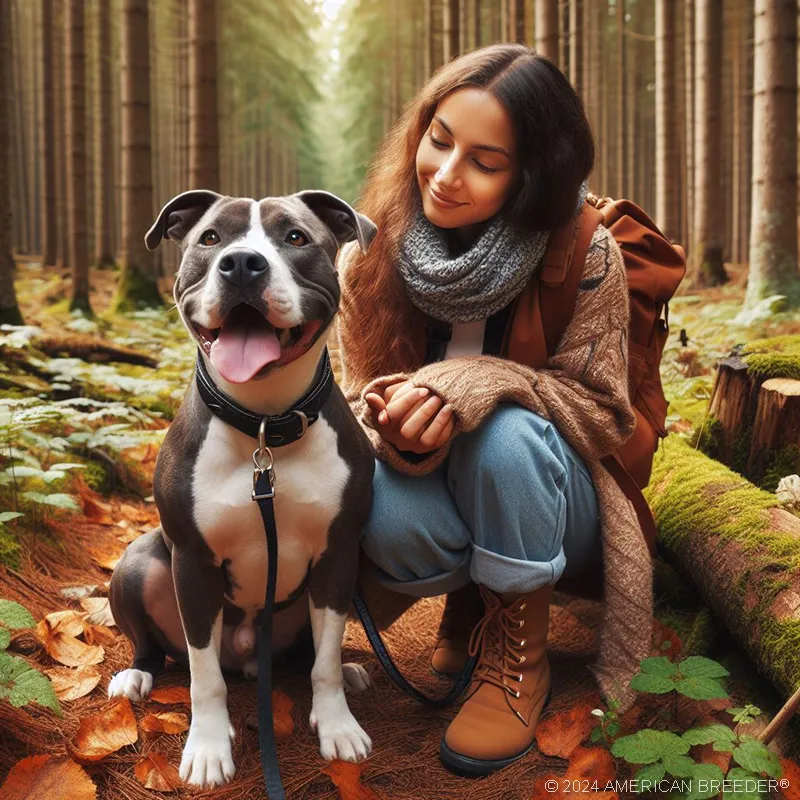 Space Requirements and Exercise Options
Space Requirements and Exercise Options
While Pit Bulls are adaptable, having a yard for play and exercise is beneficial. Regular walks, play sessions, and mental stimulation activities are essential to keep them happy and healthy.
Climate Considerations and Adaptability
Pit Bulls can adapt to different climates, but extreme temperatures should be managed carefully. Provide shelter from harsh weather and avoid excessive exposure to heat or cold.
Recommended Yard Size
While a large yard is advantageous, a smaller yard can suffice if you provide adequate exercise and mental stimulation. Regular outdoor activities and playtime help meet their energy requirements.
Ideal Living Conditions and Environment
An ideal living environment for a Pit Bull includes a secure yard, regular exercise, mental stimulation, and most importantly, a loving and attentive owner. Their loyalty and love thrive in an environment where they are treated as cherished family members.
As you uncover the layers of what makes the American Pit Bull Terrier unique, remember that responsible ownership is a lifelong commitment. By understanding their socialization needs, compatibility, and ideal living conditions, you're building the foundation for a joyful and harmonious relationship with your furry friend.
Training and Obedience
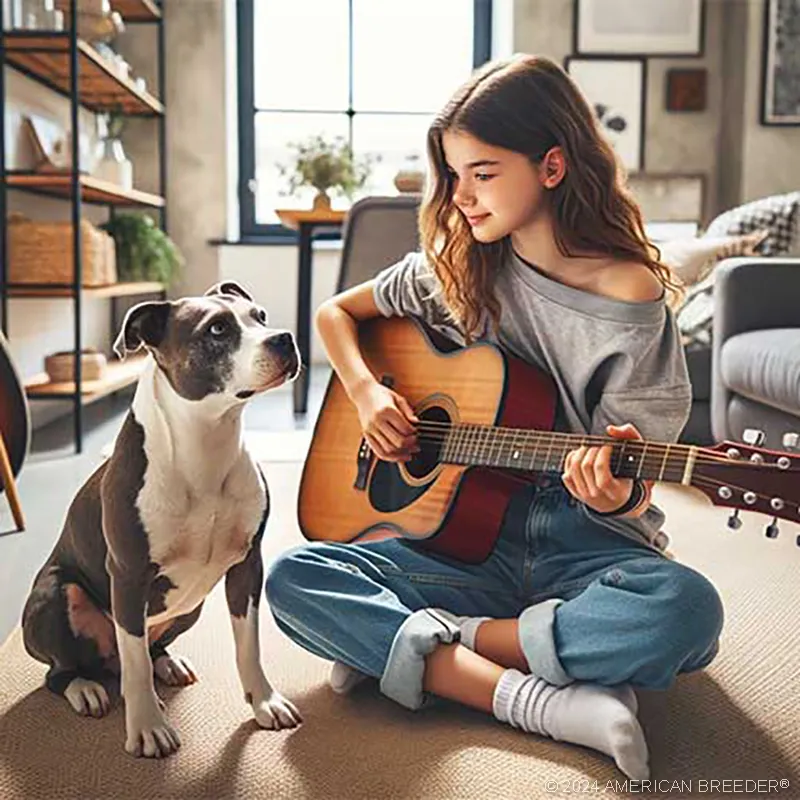 Basic Obedience Training and Commands
Basic Obedience Training and Commands
Training your American Pit Bull Terrier in basic obedience commands is not only essential for their safety but also enhances their relationship with you. Commands like "sit," "stay," "come," and "down" create a well-behaved and respectful companion.
Advanced Training or Specialized Activities
Pit Bulls' intelligence and eagerness to learn make them excellent candidates for advanced training. They can excel in activities like agility, advanced obedience, and even therapy work. These activities stimulate their minds and channel their energy in positive ways.
Behavioral Challenges or Specific Training Considerations
Understanding common behavioral challenges allows you to proactively address them. Pit Bulls may show behaviors like separation anxiety, resource guarding, or excessive barking. Positive reinforcement, consistency, and patience are key to managing these challenges.
House Training and Potty Training Tips
Consistent and positive reinforcement-based house training is crucial for Pit Bull puppies. Establishing a routine, rewarding desired behaviors, and supervising closely during potty breaks aids in successful housebreaking.
Leash Training and Walking Etiquette
Leash training teaches your Pit Bull to walk politely on a leash without pulling. Teaching loose leash walking and practicing good walking etiquette ensures enjoyable walks and safe outings.
Exercise and Activity
 Daily Exercise Needs and Recommendations
Daily Exercise Needs and Recommendations
Pit Bulls thrive on regular exercise and mental stimulation. Aim for at least 30 to 60 minutes of physical activity daily, which can include walks, playtime, and interactive games.
Mental Stimulation Activities and Games
Engaging your Pit Bull's mind is equally important as physical exercise. Mental stimulation activities like puzzle toys, hide-and-seek games, and obedience training sessions prevent boredom and enhance their cognitive abilities.
Exercise Routines and Activity Ideas
Creating a structured exercise routine keeps both you and your Pit Bull engaged. Mix in activities like fetch, agility training, and even dog sports to keep their energy well-directed.
Energy Outlets for High-Energy Breeds
For high-energy Pit Bulls, providing various energy outlets is crucial. Engage in activities that challenge them physically and mentally, ensuring a balanced and satisfied dog.
Training is a transformative journey that strengthens the bond between you and your Pit Bull. By investing time and effort into their training and exercise routines, you're not only enhancing their behavior but also nurturing their well-being. Stay committed to their growth and happiness, and watch your Pit Bull flourish into an obedient and confident companion.
Financial Planning
Typical Price Range for Purchasing an American Pit Bull Terrier Dog
The cost of purchasing a Pit Bull from a reputable breeder can vary based on factors such as pedigree, lineage, and location. On average, you can expect to pay anywhere from $500 to $2,000 for a well-bred Pit Bull puppy.
Initial Costs
Beyond the purchase price, there are initial costs to consider. These may include adoption fees (if adopting from a shelter), vaccinations, spaying or neutering, microchipping, and essential supplies such as a crate, collar, leash, and food bowls.
Ongoing Expenses
Owning a Pit Bull involves ongoing expenses to ensure their health and happiness. These expenses include high-quality dog food, routine veterinary care, grooming, training classes, toys, and preventive medications.
Considerations for Pet Insurance or Budgeting for Unexpected Medical Costs
Pet insurance is an option to consider, as it can help offset unexpected medical expenses. Alternatively, creating a dedicated savings fund for potential medical costs ensures you're prepared for any emergencies that may arise.
Options for Pet Care During Vacations or Travel
When planning vacations or travel, you'll need to consider pet care options. These include finding a reliable pet sitter, using boarding facilities, or relying on friends or family to care for your Pit Bull while you're away.
Financial planning is an integral part of responsible ownership, ensuring that you provide the best possible life for your Pit Bull without compromising their well-being. By carefully budgeting and preparing for both routine expenses and unexpected costs, you're setting the stage for a lifelong bond built on love, care, and commitment.
Overall Summary
Concise and Cohesive Summary of Key Details
In your journey to become a knowledgeable and dedicated Pit Bull owner, you've gained insights into every facet of this remarkable breed. From their history and characteristics to their care and training needs, you're now equipped with a comprehensive understanding.
Highlight Interesting and Fun Facts
Beyond the practical information, you've also discovered the unique quirks and qualities that make the American Pit Bull Terrier special. Their loyalty, intelligence, and resilience create a companion unlike any other.
Capture the Breed's Unique Characteristics and Appeal
The American Pit Bull Terrier embodies loyalty, affection, and an indomitable spirit. Their journey from historical working roles to beloved family companions is a testament to their adaptability and enduring appeal.
Create Excitement and Enthusiasm for Potential Dog Owners
For those considering bringing an American Pit Bull Terrier into their lives, your newfound knowledge is a gateway to a rewarding and joyful journey. With dedication, patience, and love, you have the opportunity to build a bond that will enrich both your lives.
Conclusion
Summary of Key Information and Considerations for American Pit Bull Terrier Owners
Congratulations on completing this comprehensive guide to the American Pit Bull Terrier! Armed with a deep understanding of their history, characteristics, care, and training needs, you're well-prepared to embark on a fulfilling journey as a Pit Bull owner.
Encouragement to Continue Learning and Seeking Expert Guidance
Your dedication to learning and your Pit Bull's well-being is commendable. As you continue your journey, remember that every dog is unique. Seeking guidance from professionals, fellow owners, and your own intuition will guide you in making the best decisions for your companion.
Responsible Ownership, Commitment, and Providing a Loving Home for a Dog
Above all, your role as a responsible Pit Bull owner is a commitment to providing a loving and nurturing home. By upholding ethical practices, embracing responsible ownership, and cherishing the bond you share, you're contributing to the betterment of this remarkable breed.
As you embark on this journey, remember that you're not just a Pit Bull owner—you're a guardian of a legacy, a steward of their well-being, and a source of unwavering love. Embrace this role with open arms and an open heart, and may your journey be filled with joy, growth, and endless tail wags.
Your journey as a dedicated Pit Bull owner is just beginning. With the knowledge and insights you've gained from this guide, you're ready to provide your companion with a life of love, care, and adventure. Cherish every moment, and may your bond with your American Pit Bull Terrier be a source of joy and fulfillment for years to come.
American Pit Bull Terrier Dog Quick Reference Guide
Breed Background: Origin: United States | Breed Purpose: Working, Guarding, Companionship | AKC Class: Terrier | Year Recognized by AKC: 1936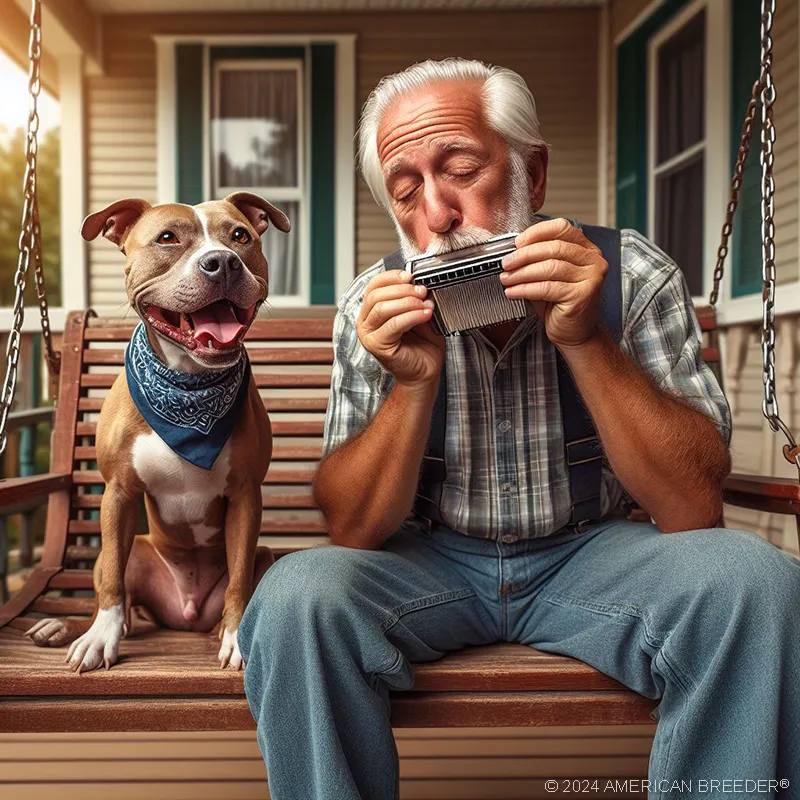 Appearance: Size: Medium | Weight: 30-60 lbs | Coat Type: Short and Smooth | Colors & Patterns: Various colors, no specific pattern | Distinctive Features: Muscular build, powerful jaws
Appearance: Size: Medium | Weight: 30-60 lbs | Coat Type: Short and Smooth | Colors & Patterns: Various colors, no specific pattern | Distinctive Features: Muscular build, powerful jaws
Temperament: Energy Level: 4/5 | Friendliness to Pets: 3/5 | Friendliness to Strangers: 2/5 | Trainability: 3/5 | Playfulness: 4/5 | Frequent Barker: 2/5 | Chase Instincts: 3/5 | Sense of Smell: 2/5 | Drive to Hunt: 3/5
Health & Care: Health Issues: Hip Dysplasia, Skin Allergies | Lifespan: 12-16 years | Grooming Difficulty: Low | Exercise Needs: High
Socialization: Interaction with Children: Supervised recommended | Interaction with Pets: Varies, early socialization important | Interaction with Strangers: Cautious | Ease of Training: Moderate
Suitable Living Arrangements: Apartment: Yes (with regular exercise) | House: Yes | Rural Area: Yes | Yard Size Requirements: Medium to large yard recommended
Training & Obedience: Trainability: 3/5 | Intelligence: 3/5 | Obedience: 3/5 | Problem-Solving: 3/5 | Easily Stimulated: 4/5 | Focus Level: 3/5 | Easily Distracted: 3/5
Financial Planning: Typical Price Range: $500 - $2000 | Initial Expenses: Vaccinations, Spaying/Neutering | Ongoing Annual Expenses: Food, Vet Visits
Breeding: Reproductive Maturity: 12-18 months | Litter Frequency: 1-2 litters per year | Litter Size: 5-10 puppies | Stud Cost: Varies | Breeding Challenges: Finding suitable mates, whelping supervision

